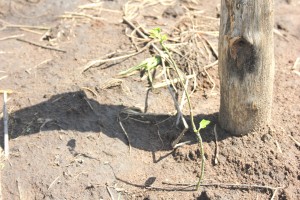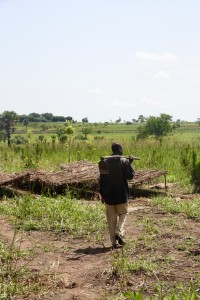News update: Otong Primary School
May 25, 2015As you may have gleaned from our updates on Twitter and Facebook, our school demonstration gardens project is now in full swing! Over the past few months, the school garden groups across Amuru democratically elected their leadership committees, drew up work plans, completed crop selection, prepared the land for planting and received agricultural training from our staff. With the land prepared, and the rainy season upon us, the garden groups have now begun the all-important planting.
One of our partner schools is Otong Primary School, situated off a feeder road in the Paddo sub-country of Amuru. The school, which currently has 460 pupils, has been extremely supportive of the project and has donated a sizeable piece of land (33m by 140m), which is already fenced to the garden group, who have named themselves “Unity is Good for Education Garden Group”.
The parents at Otong Primary School have working extremely hard in their garden; over the past few weeks, the group prepared raised nursery beds, where they have now planted red onions. Rows and rows of passion fruit seeds have also been planted; up next for planting is maize, and banana trees!
One of our agricultural officers, Babra, has been working with the group every step of the way, and visits the garden every Tuesday to equip the members with good agricultural techniques, which will maximise their yields.
The school’s head teacher, Jane, is pleased with the group’s commitment to the garden: “the project is doing well; the parents are actively involved- they came every day. Each day, a group comes and does watering, and weeding. A few more parents now visit us in the class, which is an encouragement. The parents really love their new tools, which are enabling them to work hard on the plot.”
Jane is also looking forward to using the garden as a way to teach pupils about the environment: “agriculture and the environment is a component of the syllabus, so children will be able to learn through visiting the garden with their teachers. Within our environment syllabus, we intend to visit with the children to teach them about weeding methods, and the pests which affect crops. It is going to be a helpful learning tool.” We are so pleased to hear that this garden is going to be truly multi-functional!
Next term, the livelihoods team will also be mobilizing student garden clubs, which will provide students with the opportunity to learn agricultural skills, and build their business acumen through selling their produce. The children will be able to enjoy a portion of profits, which they can use to buy scholastic materials.
Look out for more project updates soon!



